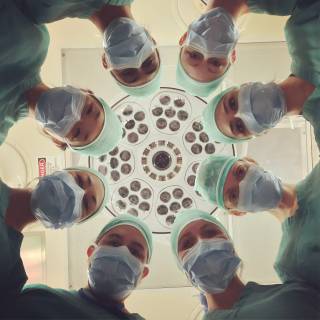Encouraging Patient and Public Involvement (PPI) in Medical Education
12 July 2021
Case study by Manuela Sadik
Undergraduate medical education is a dynamic field in which the most effective approaches to teaching are always being questioned. As medical practice moves further from traditional paternalistic structures, there is an increasing desire for patients to become facilitators of educational encounters with trainees. This is known as ‘Patient and Public Involvement’ (PPI), and is considered so important that it is now an essential requirement of undergraduate medical curriculum, according to the General Medical Council.
What was the aim of your project?
Our aim was to encourage medical educators outside of UCL to integrate PPI into their teaching. To do this, we strove to explore PPI-related literature and the UCL Medical School Curriculum, in order to create a booklet designed to:
- Encourage medical professionals to integrate PPI into their teaching
- Provide practical guidance regarding PPI teaching
- Advise patients who wish to get involved
What did you do?
After exploring an array of PPI-related literature, we elected to focus our work on discrete patient-led teaching sessions about chronic conditions; excluding longitudinal patient encounters and simulated patient experiences. Next, we identified existing teaching sessions that met this criteria from within the UCL Medical School curriculum map. This helped us to better understand how PPI is currently being used in medical education.
We also distributed a survey and hosted multiple discussion events to gauge the opinions of medical students on this method of teaching. The majority of final year students responding to our survey were positive about their experience with it. Many highlighted that such learning experiences were particularly memorable and had taught them important lessons that would influence their future practice as doctors.
Following our research, we started to create a booklet that would encourage and advise medical educators interested in incorporating PPI into their own teaching, and presented our initial work at a medical education conference.
What were the main successes of the project?
Our main success is the booklet we are currently creating. Upon its completion, we hope that it will become an established resource that enhances the medical curriculum.
Although we, as final year medical students, think very positively of patient-facilitated learning, we approached this project with an open mind and thought about this method of teaching from several different perspectives (e.g. patient, clinical teacher, student etc). We considered and appreciated the views of others - both positive and more critical - when researching this style of learning, and hope that this not only reflects in our booklet but adds to its authenticity.
What difficulties did you face during your project? What would you do differently?
The project is ongoing, and continues to grow and evolve as we learn more, so there is little we would do differently. As of now, we intend to refine our booklet so that it may be published and distributed to local medical professionals and patients who are keen to be involved in these learning encounters. Part of the refinement process will naturally involve further consultation with patients and academic staff with experience in this area for their feedback. We also want to think more about the limitations of PPI-based teaching. Which patients or patient groups are not reflected in the curriculum and why? How can we address this?
What impact has your project had? On whom?
By presenting our ideas to other final year students, teaching fellows and others who attended the medical conference, we have highlighted PPI as a beneficial teaching method and learning experience. Once our booklet is complete, we hope that it will benefit many different groups, from students who will undoubtedly gain from working with real-life patients, to doctors through simplifying the process of using PPI in teaching.
 Close
Close


